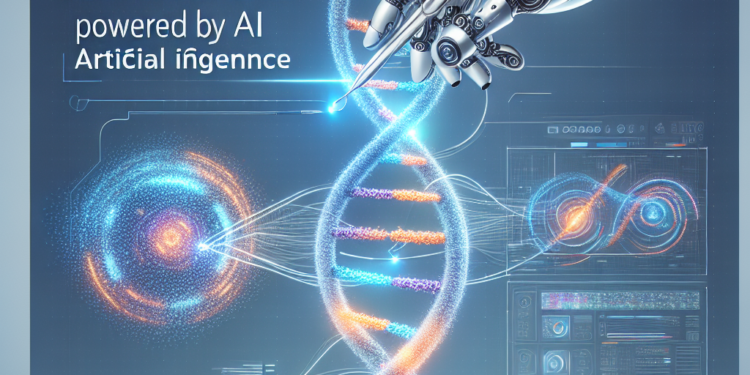Gene editing, a process of altering the DNA of living organisms, has become a powerful tool in the field of biotechnology. With recent advancements in artificial intelligence (AI), gene editing has seen a significant leap forward in terms of precision, efficiency, and speed. AI-powered gene editing techniques are revolutionizing the way scientists approach genetic manipulation, offering new possibilities for medical research, agriculture, and disease prevention.
One of the key factors driving the advancements in gene editing powered by AI is the ability of AI algorithms to analyze vast amounts of genetic data quickly and accurately. By combing through immense databases of genetic information, AI can identify specific genes that are associated with certain traits or conditions. This information is crucial for researchers looking to target specific genes for editing purposes.
AI algorithms can also predict the potential outcomes of genetic modifications, allowing scientists to make informed decisions about which genes to edit and how to do so. This predictive capability is essential for ensuring that gene editing procedures are safe and effective, reducing the risk of unintended consequences.
In addition to analyzing genetic data, AI algorithms can also optimize the gene editing process itself. By simulating various editing techniques and predicting their outcomes, AI can help researchers design the most efficient and effective editing procedures. This level of optimization can significantly reduce the time and resources required for gene editing, making the process more accessible to a wider range of researchers.
One of the most exciting applications of AI-powered gene editing is in the field of personalized medicine. By analyzing an individual’s genetic makeup, AI algorithms can identify genetic mutations or predispositions to certain diseases. This information can then be used to tailor gene editing treatments to address these specific genetic factors, leading to more targeted and effective therapies.
For example, AI-powered gene editing could be used to correct genetic mutations that cause diseases such as cystic fibrosis, sickle cell anemia, or Huntington’s disease. By precisely editing the affected genes, researchers could potentially cure these diseases at their genetic root, offering hope to millions of patients worldwide.
AI-powered gene editing is also revolutionizing the field of agriculture. By editing the genes of crop plants, researchers can create new varieties that are more resistant to pests, diseases, and environmental stressors. This has the potential to revolutionize food production, ensuring food security for a growing global population.
Another exciting application of AI-powered gene editing is in the field of conservation biology. By editing the genes of endangered species, researchers can potentially increase their resilience to environmental threats, such as climate change or habitat destruction. This could help to preserve biodiversity and prevent the extinction of threatened species.
Despite the many potential benefits of AI-powered gene editing, there are also ethical concerns that must be considered. The ability to edit the genetic makeup of living organisms raises complex questions about what constitutes “natural” and whether we have the right to manipulate the genetic code of other species.
There are also concerns about unintended consequences of gene editing, such as off-target mutations that could lead to harmful side effects. Researchers must proceed with caution, conducting thorough safety assessments and considering the long-term implications of their genetic modifications.
In conclusion, AI-powered gene editing represents a major leap forward in the field of biotechnology. By harnessing the power of AI algorithms, researchers can analyze vast amounts of genetic data, optimize gene editing procedures, and develop targeted therapies for a wide range of diseases and conditions.
While there are ethical concerns and potential risks associated with gene editing, the potential benefits are immense. From personalized medicine to agriculture and conservation biology, AI-powered gene editing has the potential to revolutionize the way we approach genetic manipulation and make significant strides towards improving human health and environmental sustainability. With continued research and careful consideration of the ethical implications, AI-powered gene editing could pave the way for a brighter, more sustainable future for all.













